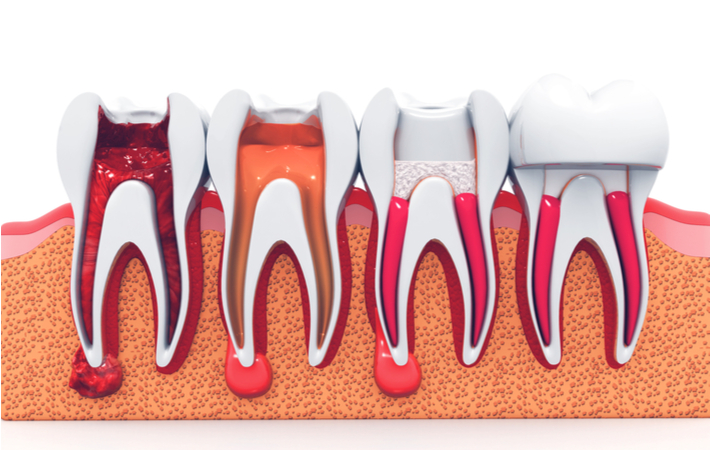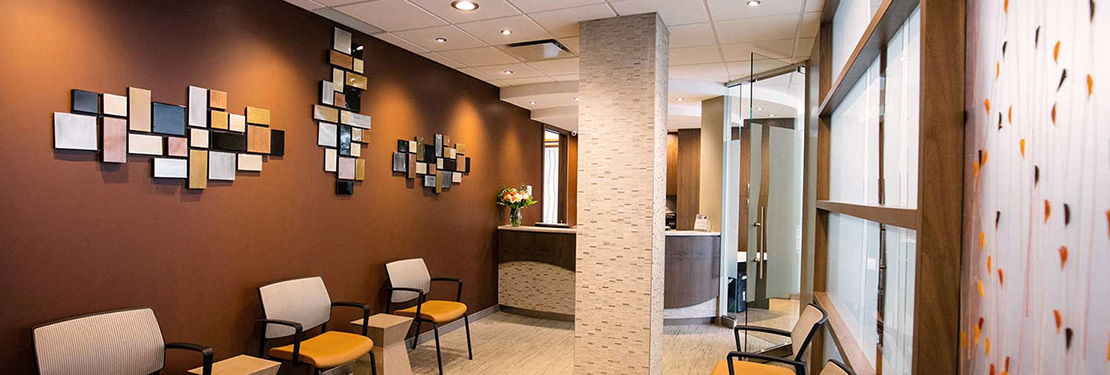What is a Root Canal?
A root canal is considered an endodontic treatment, which is a treatment for inside the tooth. The word endodontic comes from the Greek words “endo” and “odont”, which means “inside” and “tooth”, respectively.
The inside of the tooth has a soft tissue, called pulp. The pulp is beneath the enamel and a hard layer called dentin. The pulp helps to grow the root of the tooth during early development, and a fully developed tooth can survive without it.
A root canal is needed when the pulp becomes infected and needs to be removed. During the procedure, the tooth is hollowed out, and the pulp and nerve are removed down to the root. The space is then filled and sealed, and a crown is placed on the tooth to protect it and allow it to function normally.
Why Would Someone Get a Root Canal?
A root canal is needed when the soft tissue inside the root canal becomes inflamed or infected. The inflammation or infection can be caused by a variety of reasons, from decay, to chips, to untreated cavities. If the inflammation or infection is left without treatment, it can lead to an abscess.
When to Consider a Root Canal
It is important to always visit your dentist for regular exams and cleanings every 6 months, especially if you suspect you are having any sort of dental issue. During an exam, your dentist can diagnose the issue early and if possible, prevent more advanced procedures, such as a root canal.
If you are experiencing any intense pain when chewing or biting, it is in your best interest to visit your dentist. Other symptoms to watch for are chipped or cracked teeth, increasing or lingering sensitivity to hot or cold, and painful or swollen gums. Sometimes the gums can become discoloured or show decay, or produce small pimples – these can be signs that you may need a root canal.

What is a Dental Crown (& Why Do You Need One)?
A dental crown is a cap placed on top of a damaged, repaired, or broken tooth to restore it to its original function and protect it from future damage. It is an artificial, hollow tooth, and can also be used to cover a discoloured or misshapen tooth. Crowns help improve and repair normal tooth function and appearance and may be necessary after a root canal.
Can You Have a Root Canal Without a Crown?
A root canal removes the pulp from inside of the tooth, which also removes the living function of the teeth. Due to this fact, after root canals, teeth can become very prone to fracture, even with dense fillings. For this reason, your dentist will often recommend that you are fitted with a crown after a root canal, to prolong the tooth’s life and prevent future damage.
However, some teeth that are lower-risk for a fracture may be suitable for only a filling following a root canal. Incisor and canine teeth experience less stress as they are not used for chewing, so if they are left relatively intact after a root canal, they are usually good candidates for a filling-only restoration.
Root Canal FAQs
How Successful are Root Canals?
The success rate of root canals is upwards of 90% to 95%. Usually, the only instance in which a root canal would fail is when the infection, or harmful bacteria, is in the jawbone – where dentists can’t reach.
Alternatively, the freshly done root canal can become infected and will require another procedure. After a procedure, tooth decay can affect crowns and fillings, which would require a second root canal or filling. It is important to follow any oral procedures with proper aftercare, brushing, and flossing habits.
Are Root Canals Permanent?
When a root canal is performed, the tooth is hollowed out, and filled with an adhesive cement to help protect against future decay and damage. The tooth is usually covered with a crown to further protect the tooth. These artificial additions can become subject to normal wear, fractures, and decay, as a normal tooth would.
The procedure can be considered permanent, as the tooth’s nerves are removed, but the internal nerves of a tooth serve little function in a fully formed adult tooth. However, further procedures may be required if proper oral hygiene is not followed.
Is a Root Canal Painful?
Usually, root canals are performed when a tooth becomes inflamed, infected, and painful, to help relieve pain and prevent future issues. When the procedure is performed, a local anesthetic is applied to numb the area and most patients feel fairly comfortable during. Depending on the severity of the case, the tooth and surrounding area may feel sensitive for a few days after, but nothing that over-the-counter pain medication can’t relieve.
Does an Abscessed Tooth Need a Root Canal or a Filling?
An abscessed tooth is usually the result of tooth decay that has gone untreated for some time. The decay can lead to an infection of the pulp of the tooth, which can infect the root and lead to an abscess. The infection will create pus that cannot drain, thus leading to an abscess.
Fillings usually just drill out and fill a part of the tooth without drilling into the root, so an abscessed tooth would require a root canal to remove the entirety of the infection. Once the infection is removed, medication and a cement filling can be applied to protect the tooth from future infection.
What Causes Bad Breath After a Root Canal?
After a root canal, you should take special care to ensure you are following proper aftercare and hygiene habits to prevent future infection. One of the most common reactions to an influx of bad bacteria in the mouth is bad breath. Bad bacteria, if coupled with cavity, damage, or trauma to the tooth, can cause future infection.
If you suspect signs of tooth decay or are experiencing any sort of discomfort regarding your oral health, contact your dentist right away for answers to all of your questions. Your dentist will be able to point you in the right direction for your teeth, and what will give you the best quality of life. Always contact your dentist if you have any questions or concerns regarding your oral health.








